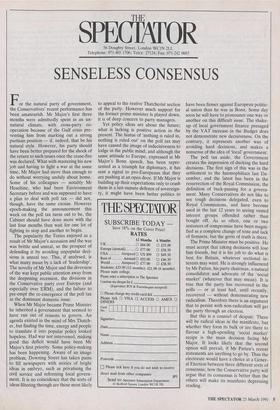SPEdATOR
56 Doughty Street, London WC1N 2LL Telephone: 071-405 1706; Telex: 27124; Fax: 071-242 0603
SENSELESS CONSENSUS
For the natural party of government, the Conservatives' recent performance has been amateurish. Mr Major's first three months were admittedly spent in an un- natural climate, with cross-party co- operation because of the Gulf crisis pre- venting him from marking out a strong partisan position — if, indeed, that be his natural style. However, his party should have been better prepared for the shock of the return to such issues once the cease-fire was declared. What with mastering his new job and having to fight a war at the same time, Mr Major had more than enough to do without worrying unduly about home. Some of his colleagues — notably Mr Heseltine , who had been Environment Secretary before and was supposed to have a plan to deal with poll tax — did not, though, have the same excuse. However epoch-making the announcement this week on the poll tax turns out to be, the Cabinet should have done more with the last four months than wait for one lot of fighting to stop and another to begin. The popularity the Tories enjoyed as a result of Mr Major's accession and the war was brittle and unreal, so the prospect of defending it by avoiding unpopular deci- sions is unreal too. This, if analysed, is what many mean by a lack of 'leadership'. The novelty of Mr Major and the diversion of the war kept public attention away from the deepening recession, the divisions in the Conservative party over Europe (and especially over ERM), and the failure to pre-empt the re-emergence of the poll tax as the dominant domestic issue.
When Mr Major became Prime Minister he inherited a government that seemed to have run out of reasons to govern. An agenda existed in the mind of Mrs Thatch- er, but finding the time, energy and people to translate it into popular policy looked hopeless. Had war not intervened, making good this deficit would have been Mr Major's first priority. Some policy-making has been happening. Aware of an image problem, Downing Street has taken pains to fill newspapers with stories of bright ideas in embryo, such as privatising the civil service and reforming local govern- ment. It is no coincidence that the sorts of ideas filtering through are those most likely to appeal to the restive Thatcherist section of the party. However much support for the former prime minister is played down, it is of deep concern to party managers. Yet policy ideas are about the future; what is lacking is positive action in the present. The hiatus of 'nothing is ruled in, nothing is ruled out' on the poll tax may have caused the image of indecisiveness to lodge in the public mind; and although the same attitude to Europe, expressed in Mr Major's Bonn speech, has been repre- sented as a triumph for diplomacy, it has sent a signal to pro-Europeans that they are pushing at an open door. If Mr Major is building up their expectations only to crush them in a last-minute defence of sovereign- ty, it might have been better politics to have been firmer against European politic- al union than he was in Bonn. Some day soon he will have to pronounce one way or another on this difficult issue. The shake- up of local government finance presaged by the VAT increase in the Budget does not demonstrate new decisiveness. On the contrary, it represents another way of avoiding hard decisions, and makes a nonsense of the idea of 'local' government.
The poll tax aside, the Government creates the impression of ducking the hard decisions. The first sign of this was in the settlement to the haemophiliacs last De- cember, and the latest has been in the resurrection of the Royal Commission, the definition of buck-passing for a govern- ment. Many Conservatives do not like to see tough decisions delegated, even to Royal Commissions, and have become used in the last 12 years to seeing vested interest groups offended rather than bought off. As so often, one or two instances of compromise have been magni- fied as a complete change of tone and lack of firmness, but the germ of truth is there.
The Prime Minister must be positive. He must accept that taking decisions will lose him friends, but it is his job to do what is best for Britain, whatever sectional in- terests may want. He is strongly influenced by Mr Patten, his party chairman, a natural consolidator and advocate of the 'social market' (whatever that may mean). It is true that the party has recovered in the polls — or at least had, until recently, recovered — without demonstrating new radicalism. Therefore there is an argument that to persist with non-radicalism will get the party through an election.
But this is a counsel of despair. There will be radical ideas in the manifesto, but whether they form its bulk or are there to flavour a high-spending 'social market' recipe is the main decision facing Mr Major. It looks likely that the second option will prevail, if Mr Patten's recent statements are anything to go by. Thus the electorate would have a choice at a Gener- al Election between three different sorts of consensus; how the Conservative party will argue that its consensus is better than the others will make its manifesto depressing reading.


























































 Previous page
Previous page